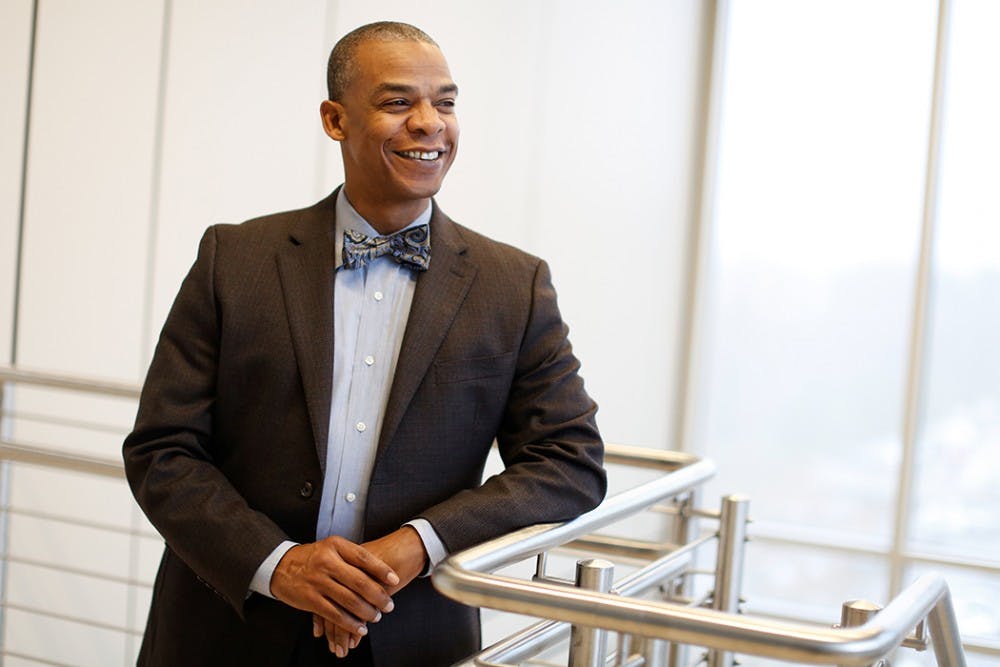John Gates, the new engineering associate dean for diversity and inclusion, is working to improve diversity within the school by conducting research on the GPA differences between white and minority students.
“We are reframing diversity. Most people think about diversity as about difference. We believe diversity includes everyone and everything,” Gates said. “Diversity is not about difference or deficits, we define diversity as excellence expressing itself through the intersection of perspectives and lived experiences. That’s critical.”
Gates said to him, diversity means experiencing.
“You look at me and you say ‘Dean Gates is diverse because he’s black.’ I’m diverse because I’m black and I’m male and I’m gay and I’m a father and I’m a grandfather and I’m a social activist, an intellectual, and I’m a globalist and I’m a nice guy,” he said. “You can’t see that — you have to experience it.”
Gates, formerly an associate dean at Harvard College, joined the Engineering School administration in March. Since then, he has been looking for ways for the Engineering School to improve diversity and for diversity to improve the school.
“We’re not doing diversity for diversity's sake, we’re doing strategic diversity. And that is diversity to achieve a strategic goal,” Gates said. “Our strategic goal is to be excellent. To be the best Engineering School we can be.”
For Gates, possibly the biggest problem he has found is that while all students entering the Engineering School have similar levels of achievement coming into the University, only 40 percent of black students graduate with above a 3.0 grade point average, compared to 85 percent of white students and 76 percent of Hispanic students.
“There are ostensibly two different U.Va.s. One for all students except black students, and another one for black students,” Gates said. “Even though we have all of the same structures and systems for everybody, their experiences and achievements are different.”
Gates’s big project for the Engineering School is a six-year-long research project to examine the underlying symptoms creating such a large grade disparity and to find a way to improve grades and the University experience for everyone.
“A rising tide lifts all boats,” Gates said. “What we do for black students will be for all students.”
Even though he’s been at the University for less than a year, Gates said he has already been making steps to improve the Engineering School. A big problem Gates found was with the enrollment caps that all engineering majors used to have.
“What we have is high-achieving students who expect to be engineers, they apply to be in the Engineering School, but didn’t fully recognize they also had to apply to be in the major, and that the majors had double caps,” he said.
Gates found that these caps disproportionately affected black students due to their on-average lower GPA. Many students, and especially minority students or first-generation college students, could not get into the major they had hoped for.
“The impact of that can be substantial,” Gates said. “What does that do to their sense of belonging? To their aspirations? To their performance level overall? To their sense of self-efficacy? All of those things become an interesting factor.”
In addition to removing the major caps, Gates also works at group and individual levels with many minority students. Gates serves as the advisor for groups like the Society for Women Engineers, Society for Hispanic Professional Engineers and the National Society for Black Engineers.
“[Gates] has been a phenomenal addition to the engineering school, and his mission of enhancing ‘high-impact’ opportunities for all students is really taking hold around E-school,” Megan Grzyb, a fourth-year Engineering student and president of SWE, said in an email to The Cavalier Daily.
Students say they appreciate the individual attention Gates provides.
“He just recently opened up one-on-one advising meetings for everyone in SHPE,” Alyson Irizarry, a third-year Engineering student and president of SHPE, said. “He’s very concerned with how our day-to-day lives are going.”
Morgan Lataillade, a fourth-year Engineering student and president of NSBE, said she hopes Gates will become even more of a resource moving forward.
“We’re still figuring out the best ways he can help us and how we can use him as a resource. With time I definitely think that’ll come into fruition,” Lataillade said.
Gates said he sees student interaction as a large part of his job here at the University.
“I have been here since March 14 [2016] and I have given now nearly 30 speeches to student groups across Grounds,” Gates said. “We support students as groups and also individually. While we are engineering, we are serving the whole of U.Va. Not just black and brown students but all students.”







